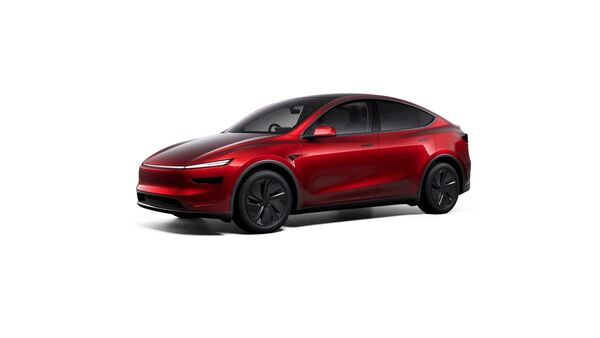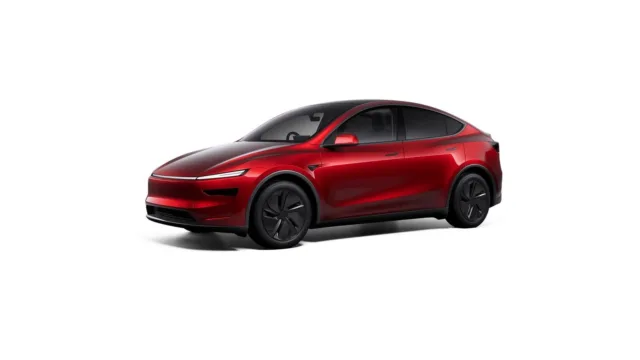The test, jointly conducted by China’s state broadcaster CCTV and ByteDance-owned auto unit Dcar, assessed the ability of EVs to handle potentially dangerous highway scenarios.

View Personalised Offers on
In a rare public benchmarking of driver assistance systems in China, Tesla has emerged as the top performer, beating over 20 local electric vehicle (EV) brands in a state-backed evaluation of Level 2 advanced driving assistance systems (ADAS).
The test, jointly conducted by China’s state broadcaster CCTV and ByteDance-owned auto unit Dcar, assessed the ability of EVs to handle potentially dangerous highway scenarios, a report by Reuters stated.
Tesla Leads, Chinese Brands Struggle
Tesla’s Model 3 and Model X passed five out of six ADAS test scenarios on Chinese highways, making them the highest-ranked models in the study. In contrast, several local brands underperformed. BYD’s premium Denza Z9GT and the Huawei-backed Aito M9 failed in three of the six scenarios, while Xiaomi’s much-hyped SU7 managed to pass just one.
Also Read : Tesla Model Y bookings open across all states of India
The tests were filmed and shared via Dcar, quickly going viral on Chinese social media, fueling online debate about the quality and safety of homegrown driving assistance systems.
Huawei, BYD Stay Silent, Musk Reacts
While Tesla CEO Elon Musk weighed in on the results on his X (formerly Twitter) account, saying “Tesla achieved the top results in China despite having no local training data,» other companies were less forthcoming. Huawei’s HIMA alliance dismissed the results as a “so-called test,» and BYD and Xiaomi declined to comment.
Musk’s remarks highlighted ongoing data constraints. Tesla cannot train its AI software within China due to data export laws and is still awaiting regulatory clearance to transfer driving data collected in Shanghai to the U.S. for algorithm training.
Also watch: Tesla Model Y: India Prices vs Global Rates. Would you be interested in buying? Let us know
Regulatory Scrutiny Grows After Fatal Crash
The timing of the test follows rising concerns over driver assistance systems in China. The deadly crash of a Xiaomi SU7 in March with the death of three people, has placed dangerous scrutiny from the public and regulation scrutiny after the authorities involved had prohibited marketing terms like «autonomous driving» and «smart driving,» to ensure that consumers don’t misuse the ADAS technologies.
China’s Ministry of Public Security recently warned that drivers will bear legal liability in accidents if they misuse or overly rely on driver assistance features, underscoring that true autonomous driving has yet to be achieved.
Consumer Perception Shifts, But Tesla Faces Market Pressure
Despite Tesla’s strong showing in the test, its sales in China have remained under pressure. The company’s China-made EV sales rose a marginal 0.8% in June year-on-year, breaking an eight-month losing streak, but still fell on a quarterly basis as local competitors introduced cheaper models.
Adding to the challenge is pricing. Tesla’s ADAS suite is sold as an optional feature for nearly $9,000 in China, while many Chinese brands—including Xiaomi and BYD—offer similar capabilities at no additional cost. Teslas also rely on cameras and AI for driver assistance, while their Chinese competitors add lidar sensors to get better performance.
In the midst of this growing semi-autonomous driving market, the test results not only revive discussions about the technology differential between Tesla and Chinese competitors, but also more pressing questions about consumer safety and regulation and the viability that will consumers trust such advanced mobility systems long-term.
Check out Upcoming Cars in India 2025, Best SUVs in India.
First Published Date: 27 Jul 2025, 08:00 am IST



![Tesla FSD Crushes China’s ADAS Competition in New Crash Avoidance Tests [VIDEO] Tesla FSD Crushes China’s ADAS Competition in New Crash Avoidance Tests [VIDEO]](https://automundochina.com/wp-content/uploads/2025/07/tesla-fsd-crushes-chinas-adas-competition-in-new-crash-avoidance-tests-video-238x178.webp)





